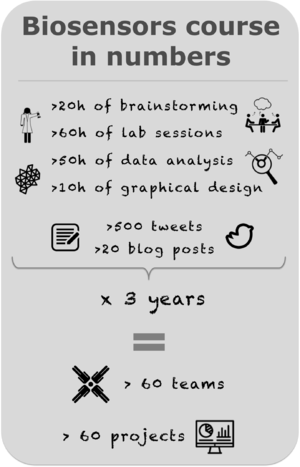Difference between revisions of "20180516 OH201"
| Line 1: | Line 1: | ||
| + | '''Open Hackuarium #201 - BioSensors - when FabLab meets WetLab''' | ||
| − | + | '''ENGLISH BELOW''' <br> | |
| − | + | ||
| − | + | * Langue principale cette semaine: '''Anglais'''<br> | |
| − | + | * Thème : '''BioSensors - when FabLab meets WetLab''' | |
| − | + | * Date : '''Mercredi 09.05.2018, 19h''', présentation et discussion à 19:30 et jusqu'à 21h | |
| − | + | * Lieu : Salle Mass Challenge, UniverCité, 3ème étage<br> | |
| − | + | * Main language this week: '''English'''<br> | |
| − | + | * Theme: '''BioSensors - when FabLab meets WetLab''' | |
| − | + | * Date: '''Wednesday 09.05.2018, 19:00''', presentation and discussion start at 19:30 | |
| − | + | * Location: Room Mass Challenge, UniverCité, 3rd Floor | |
| − | + | [[File:Biosensors-numbers.png|300px|thumb|right|]] | |
| − | '''BioSensors''' was a mandatory project-based course for 2nd year students at the interdisciplinary life science undergraduate program "Frontiers in life science" | + | '''BioSensors''' was a mandatory project-based course for 2nd year students at the interdisciplinary life science undergraduate program "Frontiers in life science" of the Centre de Recherche Interdisciplinaire ([https://cri-paris.org CRI]) at University Paris Descartes, from 2015 to 2017. |
This learning-through-research course at the interface between physics, biology and engineering was a playground to develop and confirm research and 21st century skills for 3 years of students, having as an outcome over 60 open science low-cost solutions developed entirely by the students. | This learning-through-research course at the interface between physics, biology and engineering was a playground to develop and confirm research and 21st century skills for 3 years of students, having as an outcome over 60 open science low-cost solutions developed entirely by the students. | ||
| − | + | Tamara Milosevic will present a few projects developed through rapid prototyping - teams of students had only a week to come up with an idea, propose the project, design the tools, execute the experiments and present the data. | |
| − | As a teaser, check out the [https://youtu.be/tSj9yi1aR1E video of the new summer program where Biosensors continues to live on | + | As a teaser, check out the [https://youtu.be/tSj9yi1aR1E video of the new summer program] where Biosensors continues to live on. |
| − | Biosensors projects are [https://twitter.com/biosensorsfdv | + | Biosensors projects are openly shared with this [https://twitter.com/biosensorsfdv Twitter page], on the [http://learningthruresearch.blogspot.fr LearningThruResearch blog], and on this [https://github.com/learningthruresearch GitHub page]. |
| − | on | ||
| − | and on [https://github.com/learningthruresearch GitHub]. | ||
| + | [https://twitter.com/aramataTM Tamara Milosevic] designs engaging skill-development courses and is currently mostly involved in developing the [https://rhizomeacademy.org/ Rhizome Association]. | ||
| − | |||
'''Come speak to her about interdisciplinary approaches, science teaching and meaningful project-based learning experiences!''' | '''Come speak to her about interdisciplinary approaches, science teaching and meaningful project-based learning experiences!''' | ||
Revision as of 17:11, 6 May 2018
Open Hackuarium #201 - BioSensors - when FabLab meets WetLab
ENGLISH BELOW
- Langue principale cette semaine: Anglais
- Thème : BioSensors - when FabLab meets WetLab
- Date : Mercredi 09.05.2018, 19h, présentation et discussion à 19:30 et jusqu'à 21h
- Lieu : Salle Mass Challenge, UniverCité, 3ème étage
- Main language this week: English
- Theme: BioSensors - when FabLab meets WetLab
- Date: Wednesday 09.05.2018, 19:00, presentation and discussion start at 19:30
- Location: Room Mass Challenge, UniverCité, 3rd Floor
BioSensors was a mandatory project-based course for 2nd year students at the interdisciplinary life science undergraduate program "Frontiers in life science" of the Centre de Recherche Interdisciplinaire (CRI) at University Paris Descartes, from 2015 to 2017.
This learning-through-research course at the interface between physics, biology and engineering was a playground to develop and confirm research and 21st century skills for 3 years of students, having as an outcome over 60 open science low-cost solutions developed entirely by the students.
Tamara Milosevic will present a few projects developed through rapid prototyping - teams of students had only a week to come up with an idea, propose the project, design the tools, execute the experiments and present the data.
As a teaser, check out the video of the new summer program where Biosensors continues to live on. Biosensors projects are openly shared with this Twitter page, on the LearningThruResearch blog, and on this GitHub page.
Tamara Milosevic designs engaging skill-development courses and is currently mostly involved in developing the Rhizome Association.
Come speak to her about interdisciplinary approaches, science teaching and meaningful project-based learning experiences!
